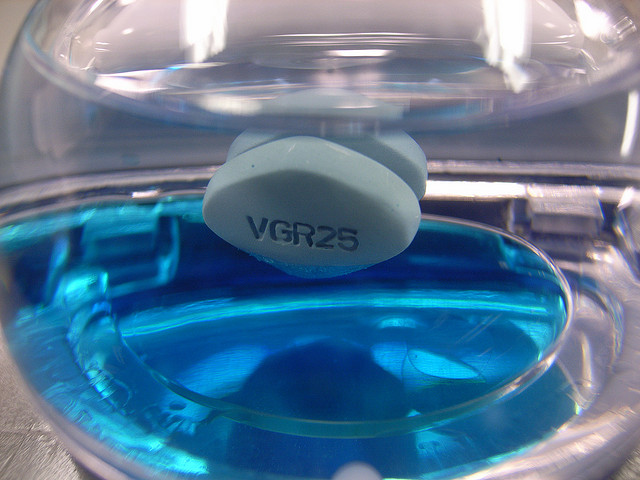One of the possible side effects of treating prostate cancer with radiation is erectile dysfunction. A recent study evaluated an unlikely prophylactic therapy. Viagra, affectionately known as the “little blue pill,” has proven to be quite effective at improving, and possibly preventing, sexual dysfunction in men who have had radiation therapy when the drug was taken before, during and after treatment.
The idea is based on past research conducted in animals that illustrated penile rehabilitation with a phosphodiesterase type-5 inhibitor (such as Viagra) could improve vascular function in animals with prostate cancer regardless of the type of cancer therapy used. Penile rehabilitation involves the usage of prescription medications as a preventative measure for erectile dysfunction prior to, during and after radiation. This past research also indicated that using a medication such as Viagra as a prophylactic may actually prevent erectile dysfunction as a side effect of cancer therapy.
The recent controlled and randomized study is the first one of its kind to show that penile rehabilitation was beneficial for men undergoing radiation therapy. Participants were split into two groups, one of which was given Viagra 50 mg once a day, and the other was given a placebo.
Study investigators then followed the 295 randomized men every three months for the first year and then again at 18 and 24 months respectively. The men completed the International Index of Erectile Function (IIEF), the International Prostate Symptom Scale (IPSS), and a measurement of their quality-of-life at each interval.
The results showed that, at 6 and 24 months, the men who were treated with Viagra prior to starting radiation and who continued it during and after the therapy had less incidence of sexual dysfunction than men in the placebo group.
Although scientists do not fully understand why or how the drug works in this particular application, there is speculation that the drug is successful because it treats the causes of erectile dysfunction by promoting retained erections, improving vascular protection and enhancing cavernosal oxygenation, which leads to reduced cavernosal fibrosis. Neuroprotective and regenerative mechanisms are also possible reasons.
For more information on this topic contact Dr. Michael S. Kaplan, a recognized authority in the field of urology. Call (702) 454-6226 – same day appointments often available!


